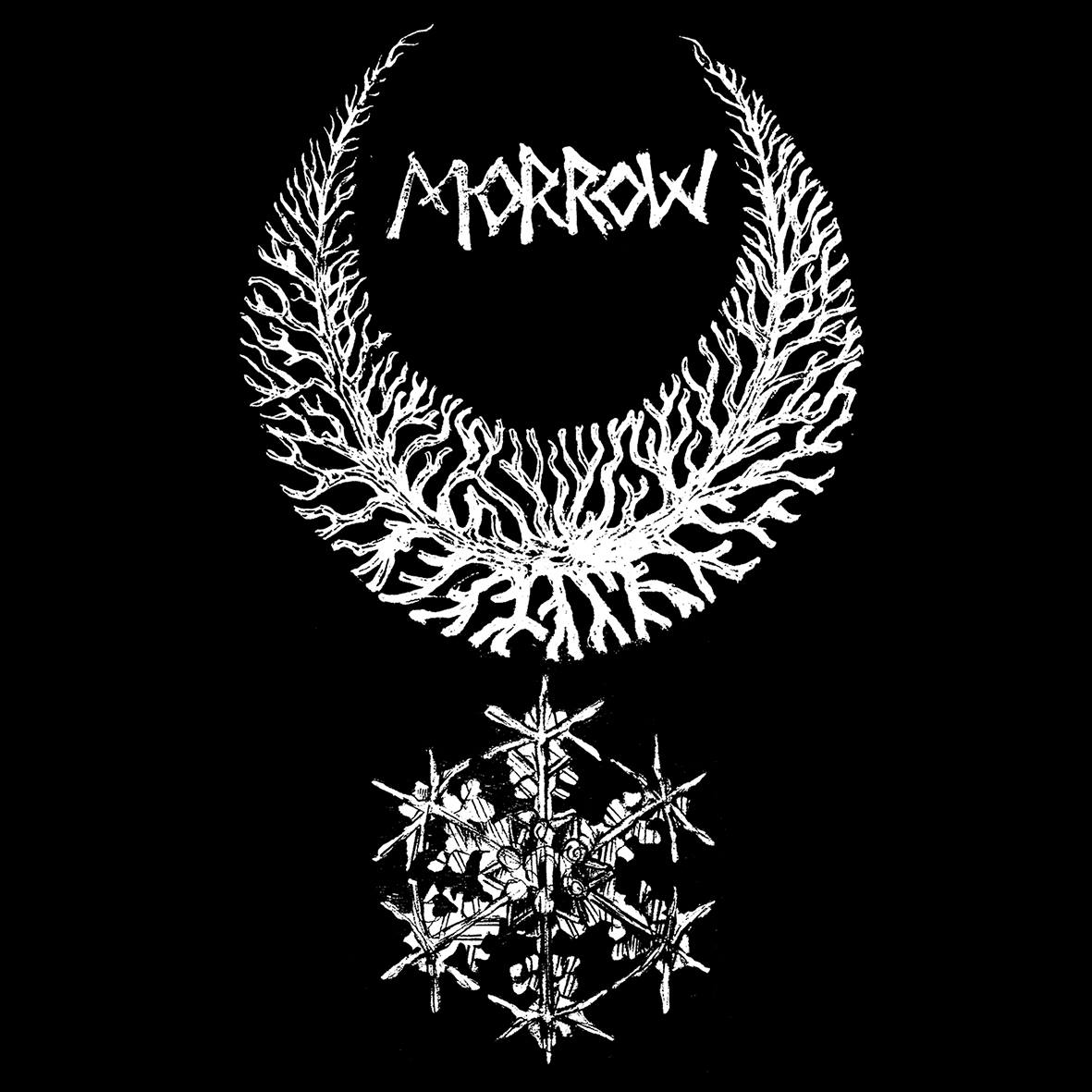
MORROW debuted with “Covenant of Teeth” album on Alerta Antifascista, Chaos Rural Records and Halo Of Flies in 2016. You can’t ignore the fact that MORROW is yet another project of Alex and his friends (FALL OF EFRAFA, CARNIST, LIGHT BEARER) so you kind of know what to expect musically and visually. But you may not know what is hiding behind the concept. MORROW shows you the world of TOMORROW, 46th century to be exact. It is not exactly tomorrow but it is enough time to pass to make you realize the world is going to be a different place. What kind of? Read the interview to find out. I talked to Alex and Dave about this concept, but you may also expect more talks on Alex’s projects on SANCTUS PROPAGANDA, but not today. Tomorrow.
Note: the interview also appeared in a Polish fanzine called CHAOS W MOJEJ GŁOWIE. Here, is the English version.
SP: MORROW is another concept band that you are all part of. Please explain this idea of forming concept bands with friends from other bands around the world collaborating. It makes rehearsing and playing gigs difficult. On the other hand, we get a very thought over project with such a great attention to detail that tells a beautiful story…
Alex: MORROW was an idea that came about four years ago when I decided I really wanted to play melodic/ emocrust again, I had these ideas of creating this story about post civilisation cultures, how we might live amongst the bones of this civilisation, surrounded by dense forests and ice sheets, I felt that this kind of music has a very raw and emotional sound which was perfect for describing a natural society. I asked lots of friends if they would be willing. It didn’t quite find traction until Dave, who I already shared the band CARNIST with, offered to help create the music. We had a long conversation about the ideas behind the band, a world reclaimed by nature, mythologies and religious identities, a collection of lost languages and peoples drawn to one another. I had an idea for a narrative and sent Dave these kind of audio cues, how I felt the story should be told, and I guess at the time, I wasn’t sure whether much would come of our good intentions, despite us both really waiting to do it. A few months later Dave sent me a rough demo of a song, and I was expecting some acoustic guitar recordings. What I got was a complete song, drums and all, and it was so cool, so exciting. Dave is an incredibly talented musician. From then on we just threw ideas at each other and very quickly formed the skeleton of the album, which would become “Covenant of Teeth”. I guess we had the idea of finding a full band later on, but that wasn’t the goal with this. We later asked Olly and Gerfried who play guitar and bass in Carnist, to join, and then recently Matthias, of our other band ARCHIVIST joined us on second guitar. My friend Nicole who plays cello in ANOPHELI, recorded the cello in San Diego, but we will hopefully be accompanied by our friend Liam on violin when we start playing shows. Practicing is hard anyway with Gerfried in Austria, but we already have two international bands between us, ARCHIVIST and CARNIST so its no different. For us music is about retaining friendships and spending time with the people we love, and creating music and art together. So whether we tour or not isn’t the focus, but its a nice idea!
SP: The people you mention are in other bands. Is MORROW for some of you a number one band with other members just collaborating or are you fine playing in a few bands at the same time, with no priority band here or there?
Alex: We don’t really have a number one band, at the moment. Between all members of MORROW we have three active bands, and one will take precedence over the other depending on what needs attention or which band is recording or touring. We don’t play too often, but again, these are passion projects, and we fit them around our lives.
SP: Is there a fixed plan for MORROW and the project will be terminated one day or things are open for the time being? Or it’s too early to ask?
Alex: MORROW shares its narrative with ARCHIVIST – both bands exist in the same story/ universe. They share imagery and ideas and at some point in the future we will conclude both bands in one release, but the story has a long way to go yet, so its not something we have discussed. We are about to record the next ARCHIVIST album and have begun work on the next MORROW record, so its all very much active with no goals beyond everything tied up at the end!
SP: MORROW’s debut album is another release being a co-operation between a few DIY labels. What is the main reason for that and not sticking with one label?
Alex: I have been good friends with Cory (Halo of Flies) and Timo (Alerta Antifascista) for many years and working with those guys is always a cooperation and holds more meaning than just labels, they are family. It helps the labels to share the financial burden of expensive releases. Matthieu of Chaos Rural records helped us release the last CARNIST 10 inch and was keen to work with Us on MORROW, so he became part of the gang.
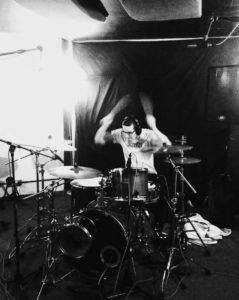
SP: Dave, in CARNIST you play fast. MORROW is much slower. Since you mostly wrote the music, did you intentionally wanted to slow down or it just worked that way? What was your musical concept for MORROW?
Dave: A combination of elements really. The first CARNIST album – to me, at least – was really about a group of friends who were so excited to do a vicious, frantic punk record that it was almost falling apart as we were playing close to the limits of our capability. Alex is always introducing me to his favourite bands, and at some point something clicked with me about the D-Beat, where taking the tempo down a touch gave so much extra weight & momentum. Combined with Gerfried writing heavier, low-end riffs this gave us the anchor-point for “Hellish”.
Around the same time I started writing for MORROW, and given the scope of what we wanted to achieve, it needed a broader palette to draw from – taking into account our histories in bands, the combination of moods & sounds on the record are very natural to us. One of the most important factors in writing the record was for every part to serve a purpose; in context of what proceeds it and what comes after it, and potentially across a number of records.
As for a concept musically speaking, it’s hard to say – we would have endless discussions using terms which don’t really have musical meaning; natural materials, states of tension, the landscape and topography of the MORROW world and so on. I’d then record layers of guitars with this in mind and see what came out. We do have a set of obvious influences; early 2000’s melodic crust, plus our own bands of the past decade, and I guess the idea was to present these within a new context. The intervening years have seen black metal & post rock hugely influence the punk underground, and produce some fantastic music – but while the momentum of change does push music forward, we feel there is so much more to be explored within that earlier era. It seems in the pursuit of “the new”, or staying ahead of the musical curve, people may have missed a great moment, or at least not paused long enough to really appreciate it – so we’re happy to go back and revisit that sound, to see what more it has to offer in a present-day form.
SP: How did you record the vocals with so many guest vocals from different countries: US, Sweden and UK?
Alex: Lots of very lovely people went to a lot of trouble to record vocals for us, hired studios etc. We sent them all guide tracks and they very kindly helped us out. All of them are either old friends or new friends whose own music has inspired us or has been the soundtrack to our lives recently. We hope they will all return for the next record, and we already have some new voices to add from friends who’ve since agreed to be involved. The story in MORROW needs lots of different languages and accents, and it was heartwarming to finally hear them all on the record!
SP: The sound of cello known from FOE appears in MORROW as well. How did the idea come about? Any plans for performing live with this instrument? It’s not an easy sound to master for a punk concert…
Alex: I am obsessed with the use of strings in crust. One of my favourite bands is REMAINS OF THE DAY from Portland, Oregon, who used violin. They weren’t the first, of course, but they captured such a sense of melancholy and despair, it was love at first listen, and it was something I tried to bring into FALL OF EFRAFA, although we abandoned it after one record. A few other crust bands have used strings and its so wonderful to hear. For years I hoped to return to that sound, and have done so with ANOPHELI and MORROW. Live we will use violin, and that will feature predominantly on our next album too, in place of cello. I think strings hold a very human like quality to their imperfections, they vibrate like human vocal chords. Percussive and stringed instruments also hold a sense of timelessness, and fit the overall theme of the music.
SP: Do you see any possibilities of incorporating other untypical instruments into your music? Delving into subjects like language, culture on your record is a short jump to various instruments representative of a given culture…
Alex: We talked about using handmade instruments of no specific culture on the first record, but with time constraints it wasn’t possible. We have definitely discussed how to incorporate new sounds, using discarded pipes and rocks and things, found objects.
SP: MORROW seems to switch between the d-beat and the slow bits of punk. Which one is the closest to your heart?
Alex: Both! Its crust, its all important!
SP: Can you explain the Norr thing on the record and the Swedish influences?
Alex: The story is set in the year 4,500, thousands of years after climate change devastated the earth and we turned to technology to salvage our world and failed. In the proceeding millennia, most of human civilisation became extinct, and the earth healed to some extent. A pan-continental ice shelf has formed across much of Canada, Greenland and Scandinavia and beyond. The story is about the movements of surviving peoples, and the Norr are one such people made up of nomadic collections of humans. Some of which are Scandinavian, who, over vast periods of time walked across the ice to North America, where their own cultural practices are absorbed by the Norr. We spoke with an archeologist about languages and the movement of peoples, and what languages would survive in North America – English, French and Spanish are the most common, and we had Spanish spoken word also, and on the next record various other languages. We attempted the idea of inventing languages, its assumed that no language would be recognisable but we felt this should be more representational by having the actual languages spoken that come together to form new languages.
SP: The cover for “Covenant of Teeth” shows trees grown on the debris of civilisation. On one hand this could be a post apocalyptic vision, on the other, anti-civilisation, anti-technology. Are you inspired by the anarcho-primitivism?
Alex: I am not anti technology, although I am a little misanthropic! There is a romance in idealising a world taken back to nature. But this is over simplifying events that would cause just as much suffering as that which we would hope to leave behind. It is in that regard, post apocalyptic, it just so happens that in our post human world, the world survived, its humans that largely didn’t. I think that humans are naturally inquisitive and that science is the study and learning of things, there is nothing inherently wrong with this. Its how we implement technology and its destructive capabilities. The story begins in Archivist, our twin band, its about human arrogance, the reasons for the world falling are the direct result of our need to control, and that technology demanding its own personhood, and what happens when we denied it that. In Morrow, it is about remnant human cultures, and as a band we observe them, we study their religions, cultural practices. They are future primitives, surrounded by the remains of ancient human culture. It is ephemeral, all of this – and future peoples will look at it like we do the ruins of Egypt or Mexico. We will regard it as beautiful, what we now see as ugly.
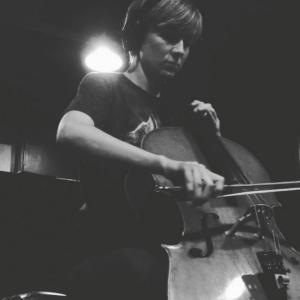
SP: I also notice the echoes of pre christian cultures, pagan cultures in your artwork, etc. Where do these references come from and why do you incorporate that into punk?
Alex: It is paganism in as far as their beliefs are based around nature worship, I tried to create a religion that the characters follow within the story, they have their own gods and beliefs, most noticeably Tyton, an Owl-like primary god, and Tesh which is a fungus god, and represents the interconnections of the forest and its inhabitants.
SP: SEDITION, CRESS and the likes used to draw inspiration from these cultures as well… Were they some sort of inspiration?
Alex: A lot of crust had this pagan like quality. I think that this aesthetic is very common. I was definitely influenced by a desire to capture some of the quality of early AMEBIX artwork, particularly the famous no god no masters face.
SP: Where did you get your musical punk influences from? What bands, styles, records influenced you the most music wise and lyrics wise?
Alex: Thats an almost impossible question! Punk has been part of both our lives since we were teenagers, and we’re both in our mid 30’s now. It shapes a great deal of our personal politics, it defines much of my life and my passions. I think in a way punk music has become this very visceral and immediate way to bring together writing, art and music for me, so in some ways my writing and drawing influences which may not have roots in punk specifically, this is a way of incorporating those influences.
Dave: Musically it’s been so exciting because it’s still a relatively new thing from my point of view – PROPAGANDHI would probably be the biggest influence on me in the last 20 years, and the punk and metal worlds in general, but this particular area, this emotionally charged form of punk wasn’t something I had delved into prior to meeting Alex. Suddenly I was being shown all these incredible bands I’d never heard before – so, while I was a FALL OF EFRAFA fan already, I was now being exposed to MADAME GERMEN, EKKAIA, ICTVS and so on. With “Covenant of Teeth” I definitely wanted to capture something of those bands, but also I was listening to modern classical artists such as Nils Frahm, Johan Johansson and so on, and I wanted to incorporate some of these film soundtrack-like atmospheric elements, to complete the picture.
SP: Let it be said: MORROW lyrics, vocabulary wise, for an average non native English speaker are a challenge to understand without actually using a dictionary. And still, they play a huge role in the whole project of MORROW so understanding is crucial here. Don’t you think this limits the reception of what you want to say to people?
Alex: For those who read the lyrics, its more about the feeling invoked, and the artwork. I wouldn’t want to change how I write lyrics, as this is the language I write in and my passion for words is why I write. I can’t simplify the words, because it won’t carry the same meaning for me, writing is inherently personal. You could argue that perhaps some of it is lost in that, but I have plenty of favourite bands that sing in different languages, and its an effort to understand them, but I guess thats the nature of language! We find a connection in the emotions. Perhaps how the different peoples form our society of the Norr! We find feeling beyond the words.
SP: Emo crust, epic crust, etc. This is what I see on your Bandcamp. As a band do you really need labels like that? It’s punk anyway.
Alex: Punk is a very broad term to describe music, one person’s punk is another person’s horrible noise. For me, emo crust speaks of its influences – screamo, crust, doom, emoviolence – it is personally my favourite genre of music, and has been for some 16 years. I wouldn’t describe it as dirty, it is evocative and passionate, dark and melancholy.
Dave: Genre labels tend to be ludicrous on the whole – most of the names make me cringe a little, but if you’re interested in the lineage of how these sounds came to be, it can be fascinating. I guess it depends who you’re talking to – between Alex and I, its shorthand and helps communicate ideas… what we do falls under the broader banner of punk, and perhaps like scientific classifications or taxonomy, where you have the divisions from kingdom through to species, you can do the same with music, following genres, subgenres and so on. All of this is completely useless except for geeking out about music that only a handful of people care about, which Alex and I are more than happy to do for hours on end.
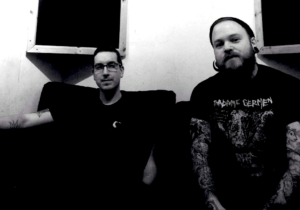
SP: Alex co-formed FALL OF EFRAFA, then came LIGHT BEARER. Dave and Alex are in CARNIST. FOE managed to establish quite a new sound, genre of punk as some may say. The band got very popular, became cult for some. Can you feel that MORROW is compared to FOE and, so to say, benchmarked with? Or even measured against it? For many people it’s easy to say ‘MORROW has FOE member’ and that says a lot. Sometimes it doesn’t do justice to MORROW, does it?
Alex: The similarities are deliberate to some extent, I wanted to play this style of music again, so for those who hear those similarities, we don’t deny that its very much embracing that as a starting point, and maybe we were finding our feet a little on “Covenant of Teeth” and will move on and find different ways to express ourselves, and we’re already doing that with the songs written for the next MORROW record. I don’t mind if people compare us, because thats to be expected, If people like MORROW thats really cool, we don’t want anything from MORROW beyond the joy of creating and sharing this music, in that regard its a fun use of our time, and it will be fun to see where that sound takes us. We will always make music and i imagine there will always be a thread of familiarity because this genre of music is a passion for us!
